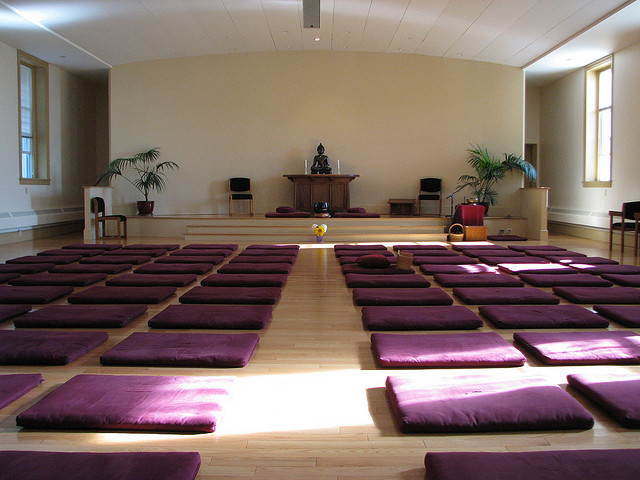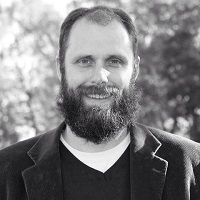In silence we come back to our Self.
We leave behind the noise and speed of the life we are anxiously planning for ourselves, and return to our true life, which is unfolding out of the silence at the center of our being.
As we go deeper and deeper into our true Self, we begin to see that we are not exclusively identified with reference points in our environment like the job or our partner, nor are we defined by our plans, strategies, fears, or expectations.
When we are identified with our relationships or defined by our successes or failures, who we are is in a state of constant fluctuation. When we get into a relationship, who we are changes; when we get out of a relationship, who we are changes; when we get a good performance review at work, who we are changes; when we get reprimanded, who we are undergoes revision, yet again.
This is the life of the ego. It is inherently co-dependent, and since everything is in a constant state of fluctuation, we always feel unhinged. As a result, we become paranoid—saturated with fear—and this fear finds expression in the life we are planning for ourselves.
The ego is trying to create certainty. It wants to know before it commits.
This is not possible.
Commitment is a prerequisite for knowing. Just as you cannot dislike a particular cuisine—Indian, Chinese, or Italian—without having first tried it, you cannot be sure without first putting yourself out there.
Vulnerability gives rise to experience, and direct experience is certainty. No one has ever stuck their hand in a fire and been confused as to whether it was hot or not.
The ego craves this type of certainty. It wants to know, more than anything, that he or she is our soul mate.
Is this the right career decision? The ego is dying to know, but it is paralyzed by fear. Its paranoia will not allow it to put itself out there and find out.
The ego does not know how to be vulnerable, which leaves us feeling discontented. Interestingly enough, this pervasive sense of discontentment is also the gateway to freedom.
We refuse to open up and commit ourselves to anyone or anything, and as a result we lack the confidence of firsthand experience. The life we have planned for ourselves hasn’t turned out like we would have liked. We feel disconnected and dissatisfied.
We try a bunch of different stuff to medicate this sense of meaninglessness—diets, self-help books, exercise regimens—all of which show promise at first, but in the end are revealed to be just another reference point to which the ego is attached.
This cycle of meaninglessness eventually brings us to the point of despair and despair is an incredibly potent state of mind.
Despair is a type of psychological fatigue. The ego is tired, so it quits resisting our experience for a moment. In this window, we can see that all of our plans and strategies, our politics, philosophies and beliefs systems—the sum total of what we think about things—are impotent.
None of it matters.
None of it has been able to bring us into a meaningful relationship with the world we live in.
Here we also see that the potency of despair is a double edged sword. When our world comes crumbling down before our very eyes, we will either seek oblivion—painfully self-destructive behavior like drugs, alcohol, or suicide—or we will seek out something truly different.
We will start to look within our Self.
We will consent to silence.
In despair we realize, not only that all of our solutions have utterly failed us, but that the thinking mind that generates these solutions isn’t as reliable as we had assumed. In fact, we realize that this false assumption belongs to the thinking mind and is the mistaken premise upon which our life of dissatisfaction rests.
Such a realization naturally encourages silence—not necessarily an audible silence, or even the absence of thought, but a willingness to let go of thought and trust our heart.
Spiritual practice is about consenting to this silence. This act of consent is called by many names—meditation, contemplative prayer, yoga—but whatever the name, the general principle is the same. We are letting go. We are letting go of the life we are imagining and in doing so we begin to claim the life that is emerging from within.
Who we truly are is like a seed.
When planted in fertile soil and nourished with water and sunlight, it grows.
When we become introspective and contemplative, we find that, in many ways, our growth has been stunted.
The seed may have been planted in fertile soil, but it has been growing in the shade. Our true life has not been nourished by the light of conscious awareness for some time. So as we begin to reconnect with our true Self, the ego is faced with an uncomfortable truth: the emotional maturity of our conscious self more or less reflects the age that we disconnected.
When, in order to protect us from a real or perceived threat, the ego appeared as a “mask”—a covering to hide our naked body or vulnerable nature—we separated ourselves from direct experience. This separation from life, as it is revealed in and through the body, left our conscious self malnourished.
As a result, the ego feels stuck in adolescence. This is a terribly difficult thing for the ego to relate to, because it still subscribes to the value system of a fifteen year old, who would much rather be physically injured than embarrassed in front of others.
The tendency to avoid embarrassment is so strong that without support the ego will seldom consent to this journey.
A mature spiritual community will not connect with the individual as they present themselves. They will not be distracted by their Sunday best, their fancy car, or well articulated “spiritual” rhetoric.
A healthy spiritual community will look past their appearance and connect with the wounded ego that is struggling to grow into the present moment. They will connect to this ego and love it into its fullest and most authentic expression.
They do this by inverting the value system of the group.
An adolescent value system misjudges the instinctual drive to belong and be a part of community. Rather than seeking meaningful interactions and authentic connection, it confuses belonging with popularity and seeks quantity instead of quality. This misunderstanding places a high premium on “being cool” as opposed to authentic.
A healthy spiritual community is a group that turns this set of values upside down.
It isn’t a group of people with good taste in music, fashion, or movies. It is a group that values belonging, over fitting in.
They establish a high premium on the courage to be.
They return authenticity to the top of the value system and they do this first and foremost by demonstrating this courage in their own life.
When they see that adolescent ego following their lead and coming out of its shell, they provide encouragement. They will, as the old saying goes, “Preach the gospel, and when necessary use words.” While leading by example and honoring courageous acts are indispensable ingredients of a healthy group dynamic, they are, in-&-of themselves, insufficient.
We must be willing to walk the path together.
While I cannot walk your path and you cannot walk mine, we can share our journey with one another.
A healthy fellowship brings new members into the group by promoting values that support the growth and expression of our authentic Self. These values are not inherited or speculative values, but principles that have been tried and tested by the individuals that comprise the group.
Therefore, as new practitioners apply these principles to their life, they will find themselves growing up to the level of the group.
A strong group will not seek to impede this growth or attempt to keep the newcomer subordinate in order to feed their own egocentric sense of superiority. They will continue to demonstrate the courage to be by working with the insecurity that fuels such selfish inclinations. In this way, each group member will find themselves growing together.
They will discover that their own growth and well-being is contingent upon the group.
Our true Self is forever expanding into the present moment. So, in every moment of everyday we are growing into the fullness of who we are.
As this journey continues to expand from our heart out into the world, our conscious self continues to struggle against the emerging demands of our unfolding life.
The long term function of a healthy group is to support each individual as they struggle to meet the needs of their true Life with the light of active awareness. So the group must grow with the individual.
As individuals feel themselves called into new frontiers, the group must respond by creating containers that support growth in these areas. If individuals start to hear the call of the body, then the group must create containers that support embodiment like yoga classes or running groups. If individuals start to feel called into deeper levels of silence, then the group must respond with retreats.
Furthermore, this response must be active, not mere passive encouragement. The individual cannot do it alone. They require the active support of the group and it is the responsibility of each individual in the group to offer this support through their presence.
One day an Amish man walked onto a bus. Someone asked him, “What is the difference between us—your average American—and the Amish?” The Amish man replied, “How many of y’all own a TV?” Everyone raised their hands. Next the Amish man asked, “How many of you believe that your family would be healthier and closer, if you did not own a TV?” Once again, everyone raised their hand. Finally the Amish man asked, “How many of you are going to go home and throw your televisions away?” No one raised their hand. “That,” he said, “is the difference between you and the Amish. If it is bad for the family, we don’t have it,” he concluded.
While it was his intent to communicate the value placed on family by the Amish, I walked away from this story with a different lesson.
American culture places high value on individualism.
“Achieve,” “persevere,” “win,” “pull yourself up by the boot straps,” any of these could be considered the American mantra.
While the individualism characteristic of the American psyche has its advantages, it also has its drawbacks.
Whatever you think of the Amish’s worldview, you must stand in admiration of their commitment to it. They are able to live without TV and a great many other modern amenities, not because they are more disciplined individuals, but because they are individuals supported by a group.
We as individuals too often fail to live the life we feel called to, not due to a lack of desire, but because we lack the necessary support. The support of a strong community is capable of bringing us beyond the limits of individualism, beyond the whimsical desires and fleeting fears of our small self, into our true Life—the life preordained by our biology, the image of God printed on our heart, our Buddha-nature, or however you choose describe it.
This is the life that is waiting for us, and we will, as St. Augustine said, be restless until we come to rest in it.
Love elephant and want to go steady?
Sign up for our (curated) daily and weekly newsletters!
Editors: Emily Bartran / Renee Picard
Photo: gihin/Flickr







Read 0 comments and reply